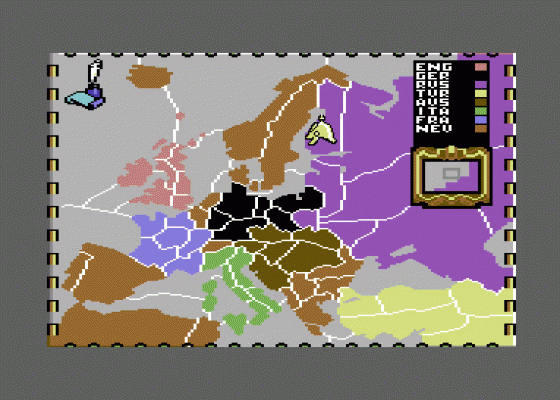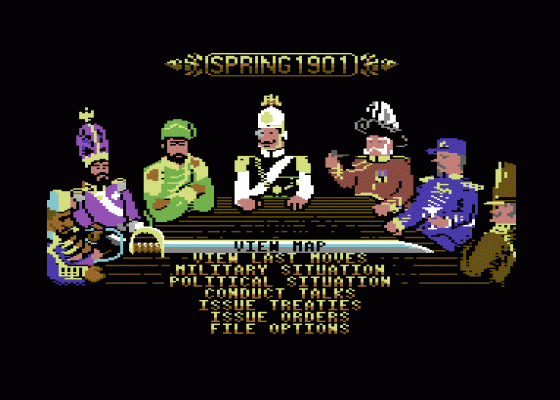
Commodore Format
 1st January 1991
1st January 1991
Categories: Review: Software
Publisher: Leisure Genius
Machine: Commodore 64
Published in Commodore Format #4
There's a little bit of a powermonger in everyone and this game proves it. Since it came out as a board game, millions of people have become addicted - some even play campaigns by post. Now Virgin/Mastertronic have made a frontal assault on the micro market. The question is - who will get their asses kicked?
Diplomacy (Leisure Genius)
Diplomacy is the art of saying "Nice doggie" until you can find a rock to club with it. It's an attitude you need to bear in mind when tackling this game of international relations, conquest and silly hats. A true diplomat is the only person who can park on double yellow lines without getting a ticket, who can be disarming even when his country isn't, and who can hold a knife in one hand and shake hands with the other.
So, now we've got the terms clear, what's the game all about? Well, it's set before the First World War in a time when generals still considered chivalry and flash suits more important than guns and soldiers. The object of the game is to gain a bunch of territories as quickly as possible whilst thwarting your opponents' attempts to do so.
Set up options allow you to specify the number of players (between two and seven), any numbers of whom can be human- or computer-controlled. The best option for beginners is to opt for one human and six computer players, since if you have a two-player game of any sort, you're forced to control more than one country - and that can get confusing.

The action is played in two phases; diplomacy, and the issuing of orders. The diplomacy phase basically involves either being nice or nasty to an opponent. If you're conciliatory, he's more likely to agree to any request for assistance; if you're hostile, he's likely to snub you at social functions and pour beer down your shirt. Whatever you do, it's always worthwhile conducting talks with other countries, since they can provide valuable information about imminent attacks or give military support. You can also issue treaties to your opponents which allow you to do anything from forming a military alliance to declaring war.
You get to invade other countries. If the territory is unoccupied, your opponents ignore you. If the territory has an opponent's troops in it however, you have to slug it out. This is where your diplomatic relations are vital: if you have arranged for an ally to support invasion, it's free gherkins and happy songs all round. If you didn't you get your wrists slapped and run away blubbing.
Apart from winning the game, gaining territory is important for the control of supply centres: these allow you to generate more troops, either in the form of armies or fleets. The more supply centres you control, the greater the number of troop units you can generate. The aims vary according to the game you play, but basically if you manage to occupy about a dozen supply centres, you win and the whole of Europe is obliged to wear silly hats like yours.
Diplomacy is a conversion of the board game and, like most of these games translated onto computer, it lacks true interaction. You have to keep switching between map display and text before committing yourself to decisions. This is the game's worst drawback: a map display in full view all of the time, with all the options all on screen at once would have captured the feel of the board game more successfully it can be a hassle trying to remember just where Serbia, Smyma and Silesia are. The original also contains an element of cheating on deals and treaties with opponents - a feature which this version sorely misses.
The action is otherwise compelling: there's a wide variety of parameters and complexity of opponents' actions over three difficulty levels. It's also a lot of fun to see if You can outwit your enemy. In the end though, the only advantage is that you can have any number of computer opponents - and, considering the drawbacks, that might not be good enough.
Good Points
- Complex strategy varies with every game.
- Three difficulty levels ensure that even hardened diplomats are challenged.
- Any combination of human- and computer-players.
- Control up to three countries at once.
- Up to 46 games can be saved.
- Quick to calculate orders.
- The in-game action is totally joystick-controlled.
Bad Points
- Confusing command routine.
- No cheating allowed!
- Apart from the computer player option, there's nothing to recommend it over the board game.





